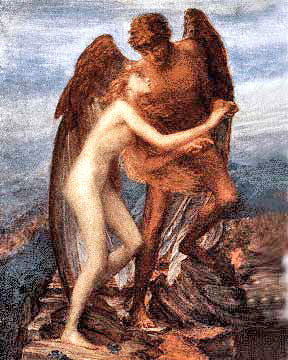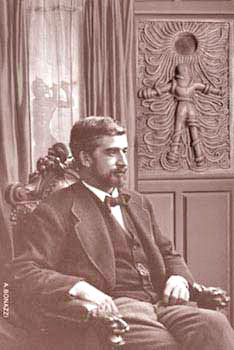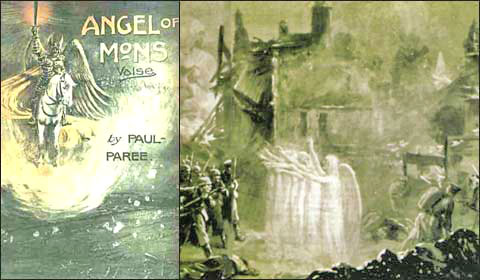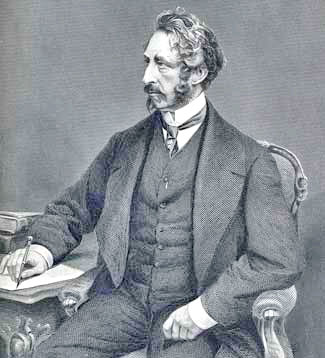Enochian Magicians, Aliens and the Nazis - Agents of Cosmic COINTELPRO and The Stargate Conspiracy?
bibliotecapleyades.net | Nov 30th -0001This page doesn't appear to be an article and therefore may not display well in the Article View. You may want to switch to the Full Web Page view.
If you know there should be an article here, help improve the article parser by reporting this page. Thanks!
| by Laura Knight from Cassiopaea Website Lest anyone doubt that current day practitioners of so-called "Enochian Magick" or OTO rituals are Fascist Synarchists, these Excerpts from: The Dawn of Magic by Louis Pauwells & Jacques Bergier 1st published in France under the title "Le Matin des Magiciens" 1960 (by Editions Gallimard, Paris, translated from the French by Rollo Myers, Anthony Gibbs & Phillips. Ltd) compared to the experiences of a modern day "Enochian Magicians" should prove the case.  The Nephilim The same forces that were behind Adolf Hitler, are behind George Bush and the Neocons. Dubya claims that God speaks to him. Hitler made the same claim. Here we get a glimpse of exactly what that means.
Adolf und die Ubermen von der Golden Dawn We have been concerned to describe these aspects of Hitlerism because, as M. Marcel Ray pointed out in 1939, the war that Hitler imposed on the world was a "Manichaean war," or as the Bible says, "a struggle between gods." It is not, of course, a question of a struggle between Fascism and Democracy, or between a liberal and an authoritarian conception of society. That is the exoteric side of the conflict; but there is an esoteric side as well. This struggle between gods, which has been going on behind visible events, is not yet over on this planet, but the formidable progress in human knowledge made in the last few years is about to give it another form. Now that the gates of knowledge are beginning to open on to the infinite, it is important to understand what this struggle is about. If we consciously want to be men of today, that is to say, the contemporaries of tomorrow, we must have an exact and clear picture of the moment when the fantastic first invaded the realm of reality. This is what we are now going to examine.
And Rauschning in an attempt to explain the rise to power of this "high priest of a secret religion," tried to convince himself that several times in history,
But where does this strange malady come from? To this question he failed to find a satisfactory answer. "Its deepest roots are hidden in secret places." It is these secret places that we feel we ought to explore. And it is not a historian, but a poet who will be our guide.
Toulet himself wrote that. It happens sometimes that important things are suspended on a pin’s head. It is thanks to a minor but charming writer, unknown despite the efforts of a few admirers, that I first heard the name of Arthur Machen, practically unknown in France.  A young Arthur Machen After some study, we discovered that Machen’s works (there are some thirty volumes in all) are, from a "spiritual" point of view, more important than those of H.G. Wells. Before entering into the heart of our subject we would therefore like to say a few words about this curious man, beginning with a little literary digression concerning a minor Parisian author, P.J. Toulet, and ending with a vision of a great subterranean gateway behind which lie, still smoking, the remains of the martyrs and the ruins of the Nazi tragedy which disrupted the whole world. The paths of "fantastic realism," as we shall see once again, do not resemble the ordinary paths of knowledge.
In November 1897 a friend, "somewhat given to the occult sciences," brought to the notice of Paul-Jean Toulet a novel by an unknown thirty-four-year-old author entitled The Great God Pan. This book, which evokes a primitive pagan world, not entirely submerged but still cautiously surviving and occasionally releasing among us its God of Evil and his cloven-hoofed angels, made a profound impression on Toulet and started him on his literary career. He began translating The Great God Pan and, borrowing from Machen his nightmarish decor with the Great Pan lurking in the thickets of our countryside, wrote his first novel: Monsieur du Paur, homme public. Monsieur du Paur was published towards the end of 1898, and met with no success. It is not an important work, and might never have been heard of had not M. Henri Martineau, a great Stendhalian and a friend of Toulet, taken it upon himself, twenty years later, to republish the book at his own expense in the Editions du Divan. M. Martineau was determined to show that Monsieur du Paur was inspired by Machen’s book, but was nevertheless an original work, so that it was through him that the attention of a few literary people was drawn to Arthur Machen and his Great God Pan and some correspondence between Toulet and Machen was brought to light. [...] For Machen, as is apparent in all his works, "man is made of mystery and exists for mysteries and visions." Reality is the supernatural. The external world can teach us little, unless we look upon it as a reservoir of symbols and hidden meanings. The only works which have some chance of being real and serving some useful. purpose are works of imagination produced by a mind in search of eternal verities. As the critic Philip van Doren Stern has pointed out:
It was a strange adventure that brought Machen back to literature. It made his name famous in a few weeks, and the shock this gave him decided him to devote the rest of his life to writing. He found journalism irksome, and no longer wanted to write for his own satisfaction. War had just broken out. There was a demand for "heroic" literature. This was hardly his line. The Evening News, however, asked him for a story. He wrote it straight off, but in his own individual style, calling it The Bowmen. The newspaper published this story on 29th September, 1914, the day after the retreat from Mons. Machen had imagined an incident in this battle: St. George in shining armour, at the head of his angels in the guise of the old archers of the battle of Agincourt, comes to the rescue of the British Army. Left: "The Angel of Mons Waltz," Sheet music. Right: The 'Angels of Mons' halt the German advance; a picture by Alfred  Left: "The Angel of Mons Waltz," Sheet music. Right: The 'Angels of Mons' halt the German advance; a picture by Alfred Pearce in A Churchwoman's 1915 book The Chariots of the Gods. The next thing that happened was that scores of soldiers wrote into the newspaper to say that this Mr. Machen had invented nothing. They had seen with their own eyes on the Mons front the angels of St. George mingling in their ranks. This they could swear to on their honour. Many of these letters were published. England, anxious for a miracle in her hour of peril, was profoundly stirred. Machen had been hurt when no notice was taken of him when he had tried to reveal the secrets of reality. Now, with a cheap kind of fantasy, he had aroused the whole country. Or could it be that hidden forces rose up, in one form or another, summoned by his imagination that had so often been concerned with essential truths and was now, perhaps unconsciously, at work deep down within him? Dozens of times Machen insisted in the Press that his story was pure invention. No one ever believed it. Right up to his death, thirty years later, Machen, now an old man, often reverted in conversation to this fantastic story of the Angels of Mons.
About the year 1880, in France, in England and in Germany some secret societies of Initiates and members of hermetic orders were founded to which a number of very influential people belonged. The story of this mystical post-romantic crisis has not yet been written. It deserves to be, as it might throw light upon the origin of several important trends of thought which have determined certain political tendencies. In two letters written by Arthur Machen to Toulet we find the following remarkable passages. In the first, written in 1899, he says:
In 1900 he wrote as follows:
Who was this "adept?" And what were Machen’s "experiences?" In another letter, after Toulet had been to London, he wrote: "Mr. Waite, who likes you very much, asks me to send you his best regards." We were interested to learn the name of this friend of Machen and to discover that he was one of the best authorities on alchemy and a Rosicrucian specialist. We had reached this point in our researches into the intellectual interests of Arthur Machen, when a friend revealed to us the existence in England, at the end of the nineteenth and beginning of the twentieth century, of a secret "initiatory" society of Rosicrucian inspiration. [See Nos. 2 and 3 of the review La Tour Saint-Jacques, 1956: ’L’ordre hermetique de la Golden Dawn’ by Pierre Victor.]
The Golden Dawn, founded in 1887, was an offshoot of the English Rosicrucian Society created twenty years earlier by Robert Wentworth Little, and consisted largely of leading Freemasons. The latter society had about 144 members, including Bulwer Lytton, author of The Last Days of Pompeii. The Golden Dawn, with a smaller membership, was formed for the practice of ceremonial magic and the acquisition of initiatory knowledge and powers. Its leaders were Woodman, Mathers and Wynn Westcott (the "occultist" mentioned by Toulet in his letter of 1900). It was in contact with similar German societies, some of whose members were later associated with Rudolf Steiner’s famous anthroposophical movement and other influential sects during the pre-Nazi period. Later on it came under the leadership of Aleister Crowley, an altogether extraordinary man who was certainly one of the greatest exponents of the neo-paganism whose development in Germany we have noted. S.L. Mathers, after the death of Woodman and the resignation of Westcott, was the Grand Master of the Golden Dawn, which he directed for some time from Paris, where he had just married Henri Bergson’s daughter.
Mathers was succeeded in his office by the celebrated poet W.B. Yeats, who was later to become a Nobel Prize-winner. Yeats took the name of "Frere Demon est Deus Inversus." He used to preside over the meetings dressed in a kilt, wearing a black mask and a golden dagger in his belt. Arthur Machen took the name of "Filus Aquarti." The Golden Dawn had one woman member [no mention of Fraulien Sprengel...? -B:.B:.]: Florence Farr, Director of the Abbey Theatre and an intimate friend of Bernard Shaw. Other members included:
It seems that on these exceptional people the Golden Dawn exercised a lasting influence, and they themselves admitted that their outlook on the world was changed, while the activities they indulged in never failed to prove both efficacious and uplifting.
Such are the "scientific" theories and "religious" conceptions on which Nazism was originally based and in which Hitler and the members of his group believed -- theories which, to a large extent, have dominated social and political trends in recent history. This may seem extravagant. Any explanation, even partial, of contemporary history based on ideas and beliefs of this kind may seem repugnant. In our view, nothing is repugnant that is in the interests of the truth.
It is well known that the Nazi party was openly, and even flamboyantly anti-intellectual; that it burnt books and relegated the theoretical physicists among its "Judaeo-Marxist" enemies. Less is known about the reasons which led it to reject official Western science, and still less with regard to the basic conception of the nature of man on which Nazism was founded -- at any rate in the minds of some of its leaders. If we knew this it would be easier to place the last World War within the category of great spiritual conflicts: history animated once again by the spirit of La Legende des Siecles. Hitler used to say:
Dr. Willy Ley, one of the world’s greatest rocket experts, fled from Germany in 1933. It was from him that we learned of the existence in Berlin shortly before the Nazis came to power, of a little spiritual community that is of great interest to us.
 Edward Bulwer Lytton This appears to be as much as Dr. Ley could tell us. He added with a smile that the disciples believed they had secret knowledge that would enable them to change their race and become the equals of the men hidden in the bowels of the Earth. Methods of concentration, a whole system of internal gymnastics by which they would be transformed. They began their exercises by staring fixedly at an apple cut in half.... We continued our researches. This Berlin group called itself The Luminous Lodge, or The Vril Society. The vril [the notion of the ’vril’ is mentioned for the first time in the works of the French writer Jacolliot, French Consul in Calcutta under the Second Empire] is the enormous energy of which we only use a minute proportion in our daily life, the nerve-centre of our potential divinity. Whoever becomes master of the vril will be the master of himself, of others round him and of the world. This should be the only object of our desires, and all our efforts should be directed to that end. All the rest belongs to official psychology, morality, and religions and is worthless. The world will change: the Lords will emerge from the centre of the Earth. Unless we have made an alliance with them and become Lords ourselves, we shall find ourselves among the slaves, on the dung-heap that will nourish the roots of the New Cities that will arise. The Luminous Lodge had associations with the theosophical and Rosicrucian groups. According to Jack Fishman, author of a curious book entitled The Seven Men of Spandau, Karl Haushofer was a member of this lodge. We shall have more to say about him later, when it will be seen that his association with this Vril Society helps to explain certain things.
We must beware of this notion of a mutation. It crops up again with Hitler, and is not yet extinct today. Hitler’s aim was neither the founding of a race of supermen, nor the conquest of the world; these were only means towards the realization of the great work he dreamed of. His real aim was to perform an act of creation, a divine operation, the goal of a biological mutation which would result in an unprecedented exaltation of the human race and the,
We must also beware of the notion of the "Unknown Supermen." It is found in all the "black" mystical writings both in the West and in the East. Whether they live under the Earth or came from other planets, whether in the form of giants like those which are said to lie encased in cloth of gold in the crypts of Thibetan monasteries, or of shapeless and terrifying beings such as Lovecraft describes, do these "Unknown Supermen," evoked in pagan and Satanic rites, actually exist? When Machen speaks of the World of Evil, "full of caverns and crepuscular beings dwelling therein," he is referring, as an adept of the Golden Dawn, to that other world in which man comes into contact with the "Unknown Supermen." It seems certain that Hitler shared this belief, and even claimed to have been in touch with these "Supermen."
We have already mentioned the Golden Dawn and the German Vril Society. We shall have something to say later about the Thule Group. We are not so foolish as to try to explain history in the light of secret societies. What we shall see, curiously That world has been defeated, but it is not dead, either on the Rhine or elsewhere. And there is nothing alarming about it: only our ignorance is alarming. [Indeed, those who forget history, etc. -B:.B:.] We pointed out that Samuel Mathers was the founder of the Golden Dawn. Mathers claimed to be in communication with these "Unknown Supermen" and to have established contact with them in the company of his wife, the sister of Henri Bergson. Here follows a page of the manifesto addressed to "Members of the Second Order" in 1896:
Hitler Claims to Have Met Them Too
It was Rauschning, too, who related the following strange episode, about which Dr. Achille Delmas, a specialist in applied psychology, questioned him in vain: It is true that in a case like this psychology does not apply:
We leave it to the reader to compare the statement of Mathers, head of a small neo-pagan society at the end of the nineteenth century, and the utterances of a man who, at the time Rauschning recorded them, was preparing to launch the world into an adventure which caused the death of sixty million human beings. We beg him not to ignore this comparison and the lesson to be drawn from it on the grounds that the Golden Dawn and Nazism, in the eyes of a "reasonable" historian, have nothing in common. The historian may be reasonable, but history is not. These two men shared the same beliefs: their fundamental experiences were the same, and they were guided by the same force. They belong to the same trend of thought and to the same religion. This religion has never up to now been seriously studied. Neither the Church nor the Rationalists -- that other Church -- have ever allowed it. We are now entering an epoch in the history of knowledge when such studies will become possible because now that reality is revealing its fantastic side, ideas and techniques which seem abnormal, contemptible or repellent will be found useful in so far as they enable us to understand a "reality" that becomes more and more disquieting. [...] The Golden Dawn is not enough to explain the Thule Group, or the Luminous Lodge, the Ahnenherbe. Naturally there are cross-currents and secret or apparent links between the various groups, which we shall not fail to point out. Like all "little" history, that is an absorbing pastime. But our concern is with "big" history. We believe that these societies, great or small, related or unrelated, with or without ramifications, are manifestations, more or less apparent and more or less important, of a world other than the one in which we live. Let us call it the world of Evil, in Machen’s sense of the word. The truth is, we know just as little about the world of Good. We are living between two worlds, and pretending that this "no-man’s-land" is identical with our whole planet. The rise of Nazism was one of those rare moments in the history of our civilization, when a door was noisily and ostentatiously opened on to something "Other." What is strange is that people pretend not to have seen or heard anything apart from the sights and sounds inseparable from war and political strife. All these movements: the modern Rosy-Cross, Golden Dawn, the German Vril Society (which will bring us to the Thule Group where we shall find Haushofer, Hess and Hitler) were more or less closely associated with the powerful and well organized Theosophical Society. Theosophy added to neo-pagan magic an oriental setting and a Hindu terminology. Or, rather, it provided a link between a certain oriental Satanism and the West. Theosophy was the name finally given to the whole vast renaissance in the world of magic that affected many thinkers so profoundly at the beginning of the century. In his study Le Thiosophisme, histoire d’une pseudo-religion, published in 1921, the philosopher Rene Guenon foresaw what was likely to occur. He realized the dangers lurking behind theosophy and the neo-pagan Initiatory groups that were more or less connected with Mme Blavatsky and her sect. This is what he wrote:
Laura’s note: I found the descriptions of Hitler’s and MacGregor Mathers’ interactions with the "gods" to be strikingly similar to another account (by Vincent Bridges, self proclaimed Enochian Magician who believes himself to be the reincarnation of John Dee.) In case the link does not work, see Most, our pseudonym for Bridges in most articles on our site.
|
Original Page: http://www.bibliotecapleyades.net/sociopolitica/sociopol_brotherhoodss14.htm
Shared from Read It Later
 enough, is that it all "ties up," and that with the coming of Nazism it was the "other world" which ruled over us for a number of years.
enough, is that it all "ties up," and that with the coming of Nazism it was the "other world" which ruled over us for a number of years.
Comments
Post a Comment